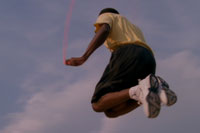|
On the outskirts of Washington DC, the Fifth Annual Silverdocs: AFI/Discovery Channel Documentary Festival was held June 12-17, 2007, featuring 100 films from 41 countries, culled from over 1,700 submissions. Dubbed "Docuwood," Silverdocs has become the preeminent documentary festival.
A major highlight was Charles Guggenheim Symposium honoring Jonathan Demme, a distinguished director of both documentaries such as "The Agronomist" and "He Comes in Peace" (Jimmy Carter) as well as feature films including "Silence of the Lambs" and "The Manchurian Candidate. "
In addition, the festival hosted a "Filmanthropy" summit, mid-day shorts, outdoor screenings, live music, panel discussions, special events, and lots and lots of parties. There were even Muslim comics attending to talk about the film STAND UP: MUSLIM-AMERICAN COMICS COME OF AGE.
"SILVERDOCS celebrates the passion and creativity of independent filmmakers and their ability to unite people across cultures and continents," said Patricia Finneran who directed what was North America's first Carbon Neutral film festival. "This year we explore the environment, the war and its impact, powerful personal perspectives on contemporary history and the future of real 2.0 (a web based movie delivery system); we invite new audiences—and the next generation of media makers—to share in the discovery of these diverse stories, and engage in a global dialogue."
The festival opened with Pete Seeger's THE POWER OF SONG, a phenomenal movie which we'll review in Scene 4's August issue.
Coma
Director: Liz Garbus
Producer: Liz Garbus, Rory Kennedy and Jed Rothstein
"Coma" isn't exactly a subject that I'd normally want to see a movie about. So this film came as a great surprise to me. I found myself emotionally drawn into a film that was well done and gave me a newfound respect for the heartbreaking dilemma faced by families of brain injury victims who come out of their comas.
Liz Garbus' film follows four patients in the Center for Head Injuries at the JFK Medical Center for the year after they "wake up" from coma resulting from brain injury.  The filmmakers give us an extraordinary glimpse into the realities of coma, persistent vegetative state and minimally conscious state. We follow the hopes and fears of families, doctors, friends, and loved ones as they cope with the ups and downs and frustrations of the long process of recovery and/or loss. The filmmakers give us an extraordinary glimpse into the realities of coma, persistent vegetative state and minimally conscious state. We follow the hopes and fears of families, doctors, friends, and loved ones as they cope with the ups and downs and frustrations of the long process of recovery and/or loss.
Hollywood's romanticized version of someone awaking from a coma and just being their old self is certainly put to rest in this film. Also put to rest is the notion that "just pulling the plug" is a viable and reasonable option. The audience is taken on an emotional roller coaster ride with the families who desperately want the return of their child, brother, financé. Your hopes rise as you see progress in terms of recognition, speech and expression. A nod, a hand squeeze, a smile, a word, a hug all are interpreted as he or she is "on the road to recovery". "He's coming back". "I can see bits of who she was". But then, even if they do become more aware and alert, the results are unpredictable. Screaming and lashing out physically and verbally at everyone around them is not uncommon. "You Bitch! You're trying to kill me. Stay away from me!" The doctors and other professional workers understand that it's part of the brain injury, but to the families an unrecognizable monster has taken the place of their child. With the families we keep hoping for recovery, but then the hopes dive as we see the anger and backsliding, sometimes into a persistent vegetative state. The days, weeks, months pass and they aren't back. The progress, if any, is slower than slow.
We watch as even the doctors who must be "used to this kind of thing" have their hopes rise and then dashed, and then rise again.
The filmmaker made an emotionally evocative film. I identified with the patients, the families and the doctors. I prayed for a positive outcome for each of these four patients. But mostly, I learned, a lot. I knew during the Terri Schiavo debacle that my opinion should have no bearing on the decision to take her off life support. I knew the decision lay solely with her family and doctors. I knew it was certainly not a political decision. But I certainly did have an opinion. What I learned from this film is there are no pat answers. There are no rules. No questions are answered only more questions raised.
The openness of the families and intimacy achieved in this film attests to the skills of the filmmaker. Well done.
Waking Aphrodite
Directors: Sarah Grosner and Lance Kruger
Producers: Sarah Grosner and Lance Kruger
I was disappointed in this film. I had heard many positive comments. And besides who wouldn't want to see a movie containing scenes with Japanese bondage and communal masturbation? And Aphrodite is, after all the Greek goddess of love and beauty and, depending on which version of the myth you read, either the goddess of sexual rapture or fertility.
Sarah Grosner directs this film about her Mother, Maggie Tapert. Not surprisingly, the director focuses mostly on what must have been the most embarrassing thing about growing up as her Mother's daughter . . . her Mother's professional life as a radical sex teacher, sacred prostitute and now aging "sexpert".
The director could not seem to decide what the film was really about. Was it about Maggie's sexual workshops or was it about her aging? The film could easily have been about both. There were wonderful messages about loving yourself and the pleasures that you can experience from being in your body. The concern about being thin, toned and firm and of meeting some ideal of "beauty" was gloriously missing in the sexual workshop scenes. Women of all shapes, sizes and ages literally exposed themselves while exposing us to the inner workings of Maggie's teachings.
I think what the director really wanted the film to be about may have been too painful to explore or was it just so woefully missing in her Mother that there was nothing to say. Maggie took on the sexual rapture and physical beauty dimensions of her Aphrodite with great gusto and amazing flare. But the dimension of love just wasn't there. Aphrodite is, after all, the goddess of love first, then beauty and sexuality. It was shocking to learn that Maggie's grown son lived in the same city and hardly ever saw his Mother. It was shocking that Maggie almost left her husband because his sexual appetite diminished and his body aged. It was shocking that Maggie seemed to experience love for the first time when her grandson was born. It was shocking that this woman who knows so much about sexuality knew nothing about love until she became a 60 year old grandmother.
Maggie Tapert was available after the screening for a Q & A. She's a striking, vibrant and beautiful woman. And she's over 60. The best question I heard was, "Do you find it ironic that the women in your workshop seemed to have love and were looking for sexual pleasure to go with it, while you seemed to have mastered sexual pleasure but knew little of love?" Maggie thought about that for quite a while before conceding that it was a very good question and something she should probably consider.
Double Time
Director: Stephanie Johnes
Executive Producer: Julie Goldman, Krysanne Katsoolis,
and Caroline Stevens
Producer: Andrea Meditch, Stephanie Johnes
and Alexandra Johnes
In the write up about this movie, it was likened to Mad Hot Ballroom, "competition with adorable kids". Double Time certainly had the competition aspect but I would never describe these kids as "adorable."
The kids, double Dutch jumpers from two teams, one from North Carolina  and the other and from South Carolina who ultimately compete against each other at the International Holiday Classic tournament at Harlem's Apollo Theatre, are dedicated and talented athletes with an amazing sense of self. The kids are showcased not only as strong individual performers but as team players. and the other and from South Carolina who ultimately compete against each other at the International Holiday Classic tournament at Harlem's Apollo Theatre, are dedicated and talented athletes with an amazing sense of self. The kids are showcased not only as strong individual performers but as team players.
Double Dutch, unlike jumping rope, is a team sport requiring intricate coordination between the jumpers and the rope twirlers. The jumpers and twirlers often change places, rotating in and out of the ropes in well choreographed, acrobatic moves.
Stephanie Johnes not only directed the film but was the cinematographer. She did an outstanding job of filming. She captures the individual personalities of these kids. Some appear to be normal kids with normal kid interests and personalities and a few have over-the-top personalities that blow you away. Each and every one of these kids is likable, worthy of our support and someone we want to see succeed. She also captures the camaraderie and unexpected, easy interaction of the team members who range in age from 7 to 17.
Johnes also does a remarkable job of capturing on film the intricacies of the routines, the flavor of the "fusion" style of combining hip-hop music and dance, and the athleticism of jumping rope. You actually feel as if you're seeing an entire routine not just the frenetic snippets of performances that so often are the product of the editing room. And because jumping rope is nonstop action, there is no possibility of getting bored.
Unfortunately, Johnes seemed not to have a clear picture of the story she wanted to tell. Walking out of the film I was unsure why Johnes spent so much time explaining the differences between "jumping rope", an individual sport, and double Dutch, a team effort. That seemed quite apparent. I was convinced that both jumping rope and double Dutch required stamina, coordination, strength, dedication, athletic ability, long hours of training. If asked "Should rope jumping and double Dutch be added to the Olympics?" I surely would have said "yes".
It wasn't until I read the web site and all the written promo pieces to prepare to write this review, that I realized the story was about two teams, the mostly white and rich, "Bouncing Bulldogs" from Chapel Hill, NC and the mostly black and poor, "Double Dutch Forces" from Columbia, SC. After viewing the film, I couldn't tell you which kids were on which team. I couldn't tell you which coach, one a man and the other a woman, coached each of the kids. It was unclear if one of these teams was the underdog team or if they both were. I did understand that the competition at the Apollo Theatre was a first for both teams. Competing at the Apollo was the goal they worked toward for months. I wanted all the jumpers to succeed especially against the seasoned Japanese teams that were "the teams to beat". I realize now that I should probably have been rooting for the poor black team or the rich white team or maybe the female coach or the male coach, but I ended up rooting for all those amazing kids as individuals and applauding their incredible skills and hoping they would that every one of them would end up competing in the Olympics.
Please Vote for Me
Director: Weijun Chen
Producer: Don Edkins
Winner of the Sterling Feature Award, awarded by the Silverdocs jury to "the most exceptional feature-length documentary screening in competition"
This film was part of Silverdoc's international documentary series "Why Democracy?" held at the National Archives. Films featured include PLEASE VOTE FOR ME from China, IRON LADIES OF LIBERIA from Liberia, DINNER WITH THE PRESIDENT from Pakistan and TAXI TO THE DARKSIDE by Alex Gibney.
Please Vote for Me is the story of an experiment in democracy in a Chinese primary school.  A third grade class in Wahun Provence is given the opportunity to democratically elect their Class Monitor. A third grade class in Wahun Provence is given the opportunity to democratically elect their Class Monitor.
I'm pretty sure this film would not convince anyone of the benefits of the democratic process. First, the three candidates, two boys and one girl, were selected by the school administrator. Second, the winning candidate will earn the job of maintaining order in the classroom and reporting rule violations to the teachers.
The candidates are:
The incumbent class monitor, selected by the school administrators in previous years, who rules by fear using his fists for enforcement.
The chubby, talkative kid who wants to win so he can boss his classmates around.
The shy little girl who cries too easily and too often.
The campaigns include the formalities of a talent show, debates, campaign workers (each candidate gets to choose two kids to work on their campaign) and an opportunity to present, in oratory form, their "platform". The rest of the campaign is left to the creative devices of each candidate. The campaigns, sadly, look far too much like the US version of "democratic campaigning". There is name calling. There are dirty tricks. The orchestrated booing during the talent show brings the performers and half the class to tears. There is hardly any focus on the ability to do the job or how each candidate will serve their fellow classmates.
The parents step in to "coach" their children to victory. While they are supportive and encourage their kids to study for the debates and speeches, they also zealously offer to pay for bribing the class with a trip and gifts, give tips on how to embarrass and defame the other candidates and one mother even becomes her son's speechwriter.
Possibly this film is best viewed as a comment on the universality of human nature rather than a comment on democracy. Mostly it is a sweet story about a class of seven year-olds being seven. Wouldn't we all be little more humane if we did what these kids ultimately did after the election, rejoiced with the winners and cried with the losers? I think so.
|